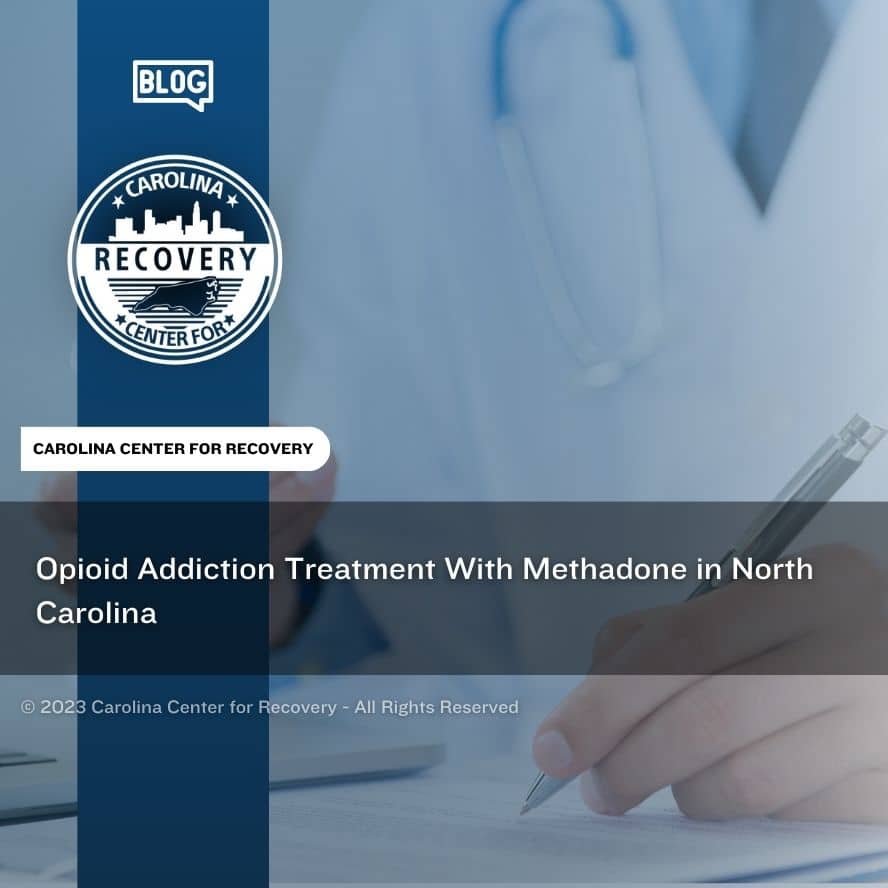Opioid Addiction Treatment With Methadone in North Carolina

Medically Verified: 2/1/24
Medical Reviewer
Chief Editor

All of the information on this page has been reviewed and verified by a certified addiction professional.
Opioid addiction is becoming increasingly common, affecting millions of Americans each year. Unfortunately, many individuals who struggle with an opioid use disorder end up experiencing life-threatening overdoses. According to the Centers for Disease Control and Prevention (CDC), “Overdoses involving opioids killed more than 80,000 people in 2021.”[1]
Because of the prevalence of fatal opioid overdoses, addiction treatment centers across the United States are embracing more aggressive methods of treatment. For example, medication-assisted treatment (MAT) is quickly becoming the preferred method of treatment for opioid addiction. These programs combine traditional addiction treatment strategies like counseling and behavioral therapy with FDA-approved medications that limit withdrawal symptoms and prevent cravings.
One of the most common medications used during MAT programs in North Carolina is methadone. Methadone is a full opioid agonist that attaches to opioid receptors to prevent withdrawal symptoms and cravings, allowing clients to focus on the emotional and behavioral aspects of recovery fully.
How Does Methadone Help the Opioid Addiction Recovery Process?
Methadone is a medication that the FDA has approved to treat opioid addiction. It is a full opioid agonist, which means it interacts with opioid receptors in the brain similarly to other opioids. As a result, your body is tricked into thinking it’s received the substance it is addicted to, preventing withdrawal symptoms and cravings from occurring.
Methadone is used to taper people off of opioids, which prevents them from having to spend their energy trying to overcome withdrawal. Instead, methadone allows patients to focus that energy on one-on-one therapy, group counseling, relapse prevention planning, and other services used to help people recover from opioid addiction.
According to the Substance Abuse and Mental Health Services Administration, MAT programs in North Carolina that use medications like methadone provide the following benefits:[2]
- Improved patient survival
- Increased retention in treatment
- Decreased illicit opiate use and other criminal activity among people with substance use disorders
- Increases patients’ ability to gain and maintain employment
- Improved birth outcomes among women who have substance use disorders and are pregnant
Is Methadone a Standalone Treatment for Opioid Use Disorder?
Opioid addiction treatment centers that use methadone in North Carolina do not provide it as a standalone treatment. While methadone can prevent relapse, it is not meant to replace traditional addiction treatment methods. Instead, methadone is combined with services like individual therapy, group counseling, and relapse prevention planning to offer patients a strong foundation for recovery.
Individual Therapy
Individual therapy is used in combination with methadone to allow patients to address the root causes of their addiction. By addressing past traumas or underlying mental health conditions, patients can overcome the issues that caused them to begin abusing opioids in the first place. As a result, their desire to return to opioid abuse will be decreased substantially.
Group Counseling
In addition to individual therapy, patients will participate in group counseling. Counseling groups allow people to get an objective understanding of their addiction by discussing it with their peers. Additionally, group counseling can combat feelings of isolation and loneliness by showing patients that they are not alone in their struggles.
Relapse Prevention Planning
Opioid addiction treatment with methadone in North Carolina also includes relapse prevention planning. Since the addiction relapse rate is between 40% and 60%, learning how to avoid triggers and overcome cravings for opioids without the assistance of medication is highly important.[3]
Aftercare Services
Lastly, medication-assisted treatment programs in North Carolina will provide each client with aftercare services that help them stay sober even after their rehab program is completed.
Examples of aftercare services include:
- Continued therapy
- Medication management for methadone
- Access to an alumni support group
- Referrals to outpatient or sober living housing programs
- Recommendations on local support groups like 12-step meetings
- Case management services like help in finding vocational, legal, and medical assistance
Signs You Need Medication-Assisted Treatment for Opioid Addiction
While medication-assisted treatment programs are not for everyone, there are some ways to tell if it is right for you. For example, people who have experienced relapses in the past or have severe opioid use disorders would benefit from attending opioid addiction treatment with methadone in North Carolina.
Signs that methadone treatment for opioid addiction is right for you include:
- Having a hard time cutting back on or stopping the use of opioids
- Attempts to quit using opioids are unsuccessful
- Continuing to use opioids despite facing physical or mental health effects
- Experiencing opioid overdoses in the past but continuing to misuse them
- Having a history of relapses after traditional addiction treatment methods
- Experiencing severe withdrawal symptoms or cravings that are difficult to overcome
Get Connected to an Opioid Addiction Treatment Center With Methadone in North Carolina
If you or a loved one suffers from an opioid use disorder, it’s time to seek help. Opioid addiction treatment centers that use methadone in North Carolina will offer you the tools and skills you need to maintain long-term sobriety.
Located in Charlotte, North Carolina, our CARF Gold Seal-accredited drug and alcohol rehab center proudly offers medication-assisted treatment to individuals battling opioid and alcohol addiction. We know just how difficult early recovery can be, but we also have the tools, resources, and expertise to help you get through it.
To learn more about methadone treatment options in North Carolina, contact the Carolina Center for Recovery today.
References:
- The Centers for Disease Control and Prevention (CDC): The Drug Overdose Epidemic: Behind the Numbers, Retrieved December 2023 From https://www.cdc.gov/opioids/data/index.html
- The Substance Abuse and Mental Health Services Administration (SAMHSA): Medications for Substance Use Disorders, Retrieved December 2023 From https://www.samhsa.gov/medications-substance-use-disorders
- The National Institute on Drug Abuse (NIDA): The Science of Addiction Treatment and Recovery, Retrieved December 2023 From https://nida.nih.gov/publications/drugs-brains-behavior-science-addiction/treatment-recovery

